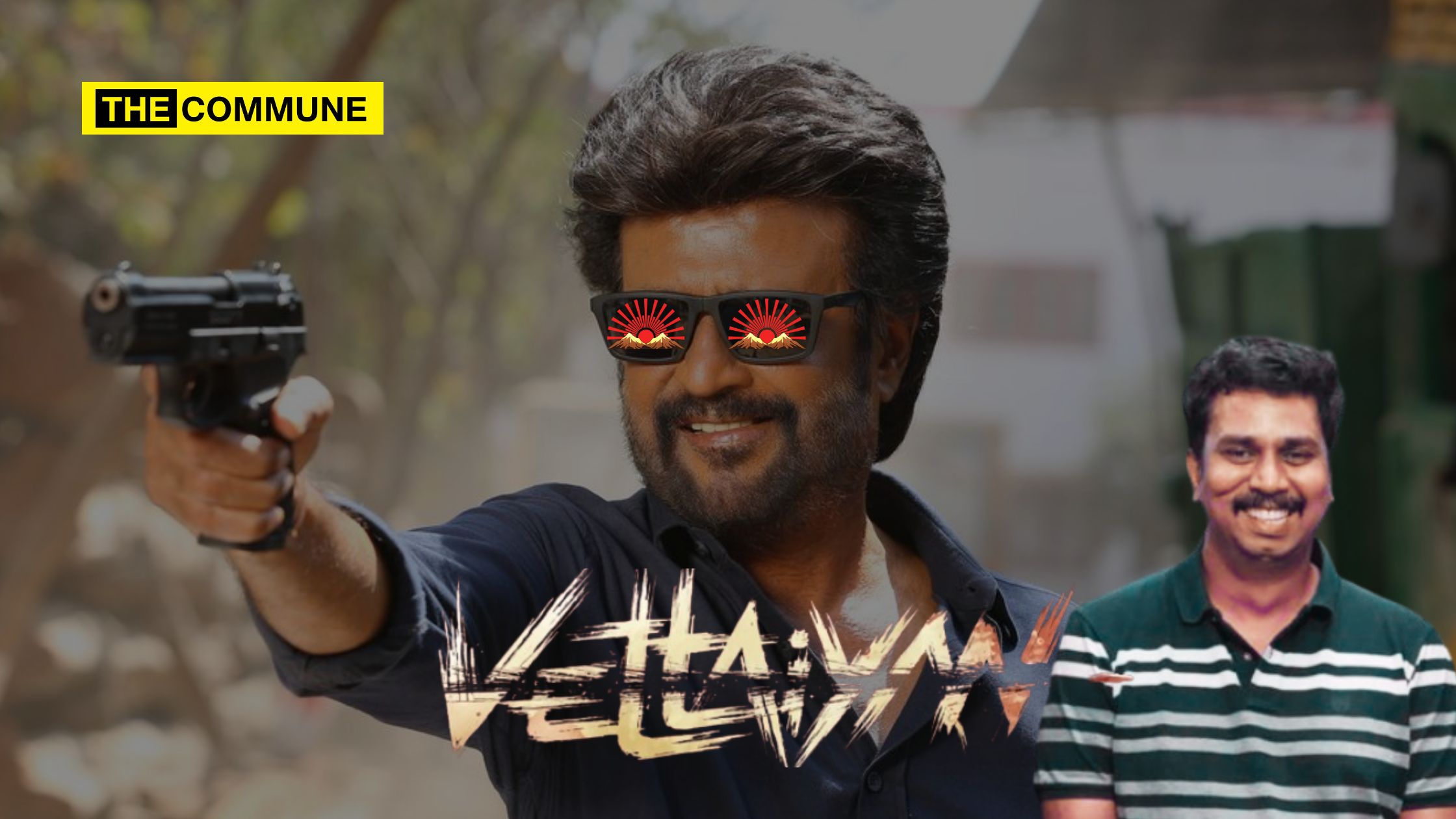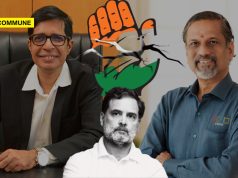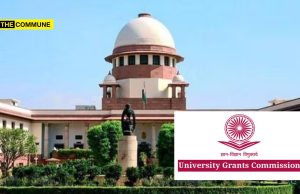
It was difficult for me to decide whether to write this review, especially as a lifelong fan of Superstar Rajinikanth. In the past, I hesitated to criticize movies like Kaala and Kabali. Still, after the third instance of Rajinikanth being part of a Dravidianist propaganda film, it’s more than a fan can tolerate.
What’s most frustrating is that Rajinikanth, despite occasionally referencing Sanatana Dharma, has become an actor who has starred in the most Dravidianist propaganda-heavy films in mainstream Tamil cinema. It is painful to watch the actor fall from a devout Sanatani to a champion of a hatemongering ideology.
If you’re a diehard Dravidianist or a thickheaded Rajinikanth fan, you may want to stop reading now.
There’s a reason why director TJ Gnanavel is called ‘Lie Bhim’ director. He is a bigot who was caught red-handed peddling false propaganda in his movie ‘Jai Bhim’ that create rift between different communities.
In the film, which focuses on the custodial death of a tribal man, the sub-inspector responsible for the death is depicted as a member of the Vanniyar community, with their sacred symbol ‘Agni’ prominently featured. However, while the film retained the real name of Justice K Chandru for Suriya’s character, it altered the facts regarding the sub-inspector’s background. In reality, the officer involved was a Dalit Christian, not a Hindu Vanniyar as portrayed in the movie.
After this misrepresentation was exposed, members of the Vanniyar community condemned the filmmakers for inciting unnecessary provocation. In another scene, Suriya’s character subtly suggests that Brahmins are untrustworthy, adding to the film’s controversies over its portrayal of certain communities.
It is with this director that Rajini chose to align himself with to mint money.
The movie starts with a surprising tribute to Thomas Babington Macaulay, the British politician who served the death blow to Indian knowledge systems. He has been praised for bringing “social justice and equality in education,” as conveyed by none other than Amitabh Bachchan. I thought to myself, “Maybe I could overlook this and enjoy the film especially with the typical strong intro scene accompanied by Anirudh’s powerful background music”. But this was just the beginning of the propaganda.
The movie’s opening scenes depict issues like drug abuse in government schools and students causing law-and-order problems. I initially thought the film was challenging the Dravidian government but soon realized it was just another token gesture. Then enters the “godly teacher” who bravely complains to the police about the drug mafia. Surprisingly, the cop teams up with a tech-savvy thief and makes him a cyber expert, which was a bit laughable.
And guess what? The film presents illogical and irresponsible scenes, such as a petty thief making millions by exploiting fake QR codes at major shopping malls and outlets. This unrealistic scenario raises concerns about fostering unnecessary fear and mistrust around UPI/QR code payments.
The song Manasilayo showcases dancers in Kerala-style Onam attire, but with the added twist of headscarves. Is this just a subtle attempt at appeasement? What’s next? Burqa-clad dancers?
As the plot unfolds, we see a boy from the slums framed for a crime, and despite having “solid evidence,” the police somehow let him escape without any real security measures in place. This unbelievable storyline only gets more frustrating as it progresses, with Rajinikanth delivering lines aimed squarely at promoting Dravidianist propaganda.
The movie takes potshots at the NEET exam and portrays it as a tool that favors the rich, without any real data to back this up. It’s obvious that the film is pushing a specific narrative, but it doesn’t even try to make sense when reality shows that many students from low-income backgrounds have succeeded in clearing NEET. The accusations against entrance exams, particularly NEET, lack any supporting data or substance, as the movie falsely claims they are conducted only in English. In reality, NEET is also offered in Tamil and other regional languages.
I couldn’t help but feel betrayed. What made Rajinikanth, once a symbol of strength and righteousness, sign up for this? Was it the money, or has he simply abandoned any ideological consistency? Produced by Red Giant, this film feels like a deliberate attempt to deceive his fans.
Furthermore, the movie unfairly portrays Hindus in a negative light, while members of minority communities are depicted as honest, virtuous, and morally upright. Hindu characters, on the other hand, are cast as murderers, corrupt police officers, and greedy corporate owners, reinforcing biased stereotypes.
Supporting actors like Rohini, playing an EOW officer, are given token roles, presumably as a nod to their loyalty to Dravidian-Communist ideology. However, I couldn’t help but notice the absence of other Dravidian actors like Prakash Raj or Sathyaraj, who could have added even more to this film’s propaganda narrative.
I used to take my entire family to Rajini’s movies, but I’ve stopped doing so over the past few years. I don’t want my kids to witness how their father’s hero has become nothing more than a tool for Dravidian propaganda.
If there’s one thing the non-Dravidianists can learn from Kollywood, it’s how effectively Dravidian directors use cinema to shape narratives.
This is not the first time Rajinikanth has played to the Dravidianist Gallery.
In 2018, Rajinikanth starred in Kaala, directed by Pa. Ranjith, a filmmaker known for his anti-Hindu stance. Rajinikanth’s character, dressed in black, is portrayed as the hero of a chawl fighting against villains wearing saffron shawls and tilaks. The film includes scenes that depict Hindu festivals negatively, with deities like Lord Vinayaka and Lord Ram shown unfavourably. The main antagonist, Hari (a name associated with Lord Vishnu), is portrayed as a practising Hindu who frequently references Krishna and Rama to justify his evil actions. At one point, Kaala even challenges Hari by saying, “If stealing my land is your God’s Dharma, then I won’t spare your God either.” The film also indirectly references BJP leader H Raja, reinforcing negative stereotypes about the Modi government.
Rajinikanth then worked with Sun Pictures for Petta, directed by Karthik Subbaraj, who has sympathized with the LTTE and figures like ‘Thirumurugan’ Gandhi. In Petta, there are subtle attacks on Hindutva, with characters sporting tilaks often shown as religious bigots, while Rajinikanth’s character helps a Muslim couple, Anwar and Anu, get married.
In his last flop show, Lal Salaam, directed by his daughter, Rajinikanth plays Moideen Bhai, a “good Muslim” character. In contrast, the villain (played by Adithya Menon) is depicted with a prominent red tilak. In one scene, Moideen Bhai criticizes the saffron-clad Senthil, saying, “What have you guys done? You’ve mixed politics with religion! You’ve injected venom in the kids playing!”
Conclusion
It is time for Rajinikanth to face the music for pushing Dravidianist propaganda. His choice of films is a betrayal of his fans, a disservice to the Tamil film industry, and a dangerous example for other actors. His recent films have consistently promoted a biased narrative that demonizes Hinduism and glorifies Dravidianism, perpetuating harmful stereotypes and sowing seeds of division.
Rajinikanth must be held accountable for his actions and realize that he cannot continue to profit from films that promote hatred and discrimination against practising Hindus.
NKR Iyer is a former Rajini fan.
Subscribe to our channels on Telegram, WhatsApp, and Instagram and get the best stories of the day delivered to you personally.




